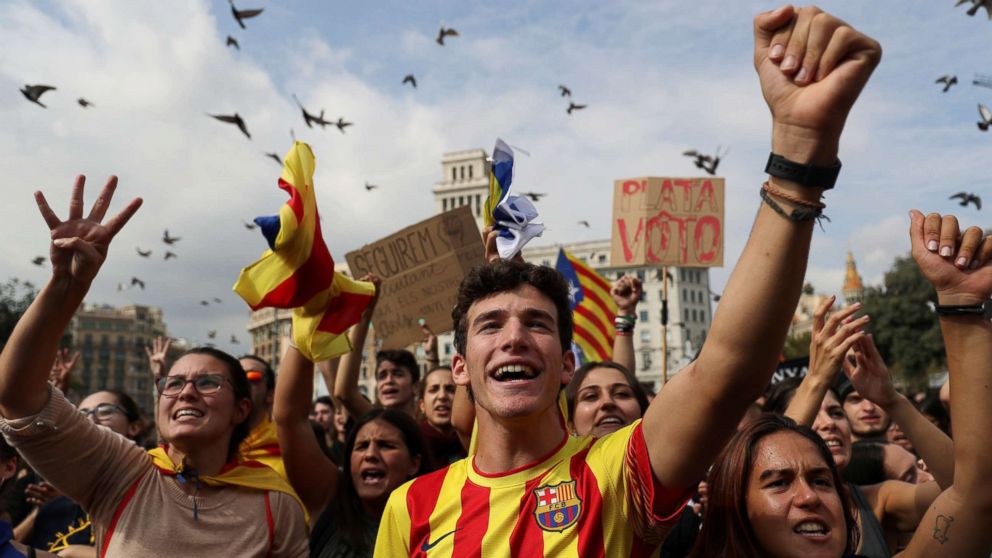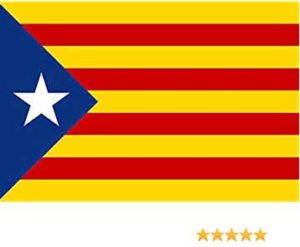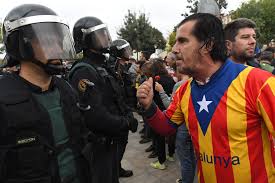Detention of Catalonia leaders seeking self-determination has lessons for all
While nearer home, the people of Kashmir and Punjab are struggling for the right to self-determination against heavy odds and a grossly inhuman approach by the Indian government, it is in order to understand how the world over, governments are maltreating peoples with a separate history and who aspire for nationhood. This is the current state of the people and leaders of Catalonia, which wants to secede from Spain. WSN publishes this piece by scholar-activist Dr Paul Newmann, which will serve the need to highlight the Catalonian cause as well as enable others struggling for the right to self-rule to learn significant lessons in how to tackle rogue states.
![While nearer home, the people of Kashmir and Punjab are struggling for the right to self-determination against heavy odds and a grossly inhuman approach by the Indian government, it is in order to understand how the world over, governments are maltreating peoples with a separate history and who aspire for nationhood. This is the current state of the people and leaders of Catalonia, which wants to secede from Spain. WSN publishes this piece by scholar-activist Dr Paul Newmann, which will […]](https://www.theworldsikhnews.com/wp-content/uploads/2019/08/Catalonia-360x270.jpg)
THE REFERENDUM IN CATALONIA, which is part of Spain was organized on the first of October 2017 and was declared illegal by Spain’s Constitutional Tribunal and boycotted by those opposed to the independence of the region. Thus far, 12 pre-independence Catalonian politicians have completed trials under Spanish laws.
The public prosecution in the Supreme Court of Spain has used SPANISH police reports to craft a narrative that speaks of “violence”, “rebellion” and “public money laundering”. The Catalonian defence team said their clients merely acted on “the mandate from the people” and never used violent means to declare or propagate independence.
Article 92 of the Spanish constitution has provisions for the King of Spain to permit a referendum. In the modern world, where the monarchy is defunct, a Catalonian cannot become the King, so by its very nature, this provision is flawed.
In the 21st century Europe and across the world, exercising the right to self-determination, either people decide about their own future, or there will be no permanent solution to the problem in various parts of the world including Kashmir and Punjab.
Notwithstanding the pitfalls of democracy, the modern world carries on governance through the ‘will of the people’. An overwhelming 90 per cent of Catalonians, in the referendum, expressed the desire for an independent Catalonia. Of the 10 per cent, many did not vote fearing state persecution and unleashing of state-sponsored violence on Catalonian civilians, which ultimately happened after the voting and declaring of the results.
In the run-up to the referendum, Spain sent thousands of troops into Catalonia to seize ballot papers and arrest pro-independence officials. Websites informing Catalans about the election were shut down.

On the day of the referendum, the police used rubber bullets and truncheons to control the crowds and keep people out of the streets. Thousands were injured in what the Times described as “one of the gravest tests of Spain’s democracy since the end of the Franco dictatorship.“1
At the same time, the perpetrators of violence during the referendum polling and the aftermath, in this case, the Spanish police, are being tried at the provincial courts at Barcelona, while those political prisoners are directly sent to the Supreme Court, violating the principle of natural justice.
The only violence that occurred during the referendum on 1 October was committed by the Spanish police or Guardia Civil, and not by the Catalan government.
In the 21st century Europe and across the world, exercising the right to self-determination, either people decide about their own future, or there will be no permanent solution to the problem in various parts of the world including Kashmir and Punjab.
Spain, which had never before invoked Article 155 of its constitution, allowing it to suspend Catalonia’s political autonomy, but it did so in October 2017 to crush the legitimate aspirations of the Catalan people.
The rights to freedom of peaceful assembly and of association:
The rights to freedom of peaceful assembly and association are enshrined in a number of international and regional human rights instruments, from Article 20(1)) of the Universal Declaration of Human Rights and Article 21 and 22 of the International Covenant on Civil and Political Rights. Similar protections exist in a number of regional human rights instruments as well, including Article 12 of the Charter of Fundamental Rights of the European Union.
The right to freedom of peaceful assembly is the right to gather publicly or privately and collectively express, promote, pursue and defend common interests.
This right includes the right to participate in peaceful assemblies, meetings, protests, strikes, sit-ins, demonstrations and other temporary gatherings for a specific purpose. States not only have an obligation to protect peaceful assemblies but should also to take measures to facilitate them.

Everyone has the right to peaceful assembly. States may not limit this right based on race, colour, sex, language, religion, political or another opinion, national or social origin, property, birth or any other status.
The right to freedom of peaceful assembly is the right to gather publicly or privately and collectively express, promote, pursue and defend common interests.
International law only protects assemblies which are peaceful, and significantly, the peaceful intentions of those assembling should be presumed.
During the referendum in Catalonia, there was sufficient evidence to validate that those people who had assembled at Barcelona were very peaceful and there was no sign of any violence. A good number of women and men, well above the age of 60, participated without any fear and exercised their right to freedom of peaceful assembly.
The Spanish authorities converted the right to assembly and demonstration, into a crime of rebellion. Spain grossly erred because neither the events of 20 September 2017 nor those of 1 or 3 October 2017, led to the kind of violence mentioned in Article 472 of the Spanish Criminal Code as this required a violent public uprising which never happened.
According to the Universal Declaration of Human Rights, freedom of expression is the right of every individual to hold opinions without interference and to seek, receive and impart information and ideas through any media and regardless of frontiers.
Participation rights are inextricably linked to other human rights, such as the rights to peaceful assembly and association, freedom of expression and opinion and the rights to education and to information. The right to, directly and indirectly, participate in political and public life is important in empowering individuals and groups and is one of the core elements of human rights-based approaches aimed at eliminating marginalization and discrimination.2
According to the Universal Declaration of Human Rights, freedom of expression is the right of every individual to hold opinions without interference and to seek, receive and impart information and ideas through any media and regardless of frontiers.
It is a well-documented fact that the Spanish police fired blank cartridges and rubber bullets, seriously injuring a person and causing him to lose sight in one eye. Easily visible was the brandishing of the baton by the police on women and men who were on the streets.
Many leading human rights groups have alleged excessive use of force by the Spanish police, which was deployed by the central authorities and which ordered to halt the vote, in part by seizing ballot materials, and in others, they used baton-charges against peaceful demonstrators outside polling locations,
Is the Spanish Judiciary independent?
The 12 judges of the Spanish Supreme court who sat on the 20-member General Council of the Judiciary which oversaw the courts were not directly elected by their peers, but appointed through a three-fifths vote in the parliament, as with the other eight members.3
Supreme Court judges are appointed by the General Council of the Judiciary (CGPJ), -the body elected by the Spanish parliament, in a process which has been challenged due to political interference, which can potentially jeopardize the independence of the high ranks of the judiciary, particularly in politically sensitive cases.
The Council of Europe has criticized that this current provision of the Spanish constitution and experts have rightly argued that this arrangement increases the risk of political influence.
The highly political nature of the ongoing criminal procedure is evidenced by the fact that the far-right political party VOX is taking part in the private prosecution.
Pretrial detention:
The right to personal liberty, in order to be compatible with international standards and the presumption of innocence, pretrial detention must only be applied as a last resort. Pre-trial detention constitutes a disproportionate restriction on the fundamental rights to free expression, peaceful assembly and personal liberty.

Many international human rights organizations who have examined the Catalonian case thoroughly have concluded that the charges against those detained are unfounded and must, therefore, be dropped.
Ideological Freedom:
Section 16 of the Spanish Constitution states that “Freedom of ideology, religion and worship is guaranteed, to individuals and communities with no other restriction on their expression than may be necessary to maintain public order as protected by law”.
In the case of the detained leaders, it is very clear that all of them stood for ideology, the ideology that represents the freedom to live and exist as a people -of the people of Catalonia. They stood for the ideology of upholding the Right to self -determination, enshrined in all human rights statutes, from the beginning of the twentieth century.
Everyone has the inherent right to self-determination; the Spanish authorities are questioning this very basic right and have imprisoned nine Catalonian political leaders as political prisoners. Spain has a conflict of interest in this trial. Spain is the sixth-worst member-state in the EU’s judicial independence perception index.4
The Spanish state forces have so far enjoyed complete impunity and there is no guarantee that it will not be extended. Keeping these events and the past history of the Spanish judiciary in view, it is pertinent that if justice and truth have to prevail, the case has to be shifted to a neutral venue and under an international tribunal.
Spain has obligations to protect freedom of expression, including political expression, under Article 10 of the European Convention on Human Rights (ECHR) and Article 19 of the International Covenant on Civil and Political Rights (ICCPR); and freedom of peaceful assembly and association under Article 11 ECHR and Article 21 and 22 ICCPR.5
Even the allegation of laundering of public money is false. Charging leading politicians, activists and social workers who have a very high reputation in society with sedition and laundering of public money is an absurd charge with complete disrespect to human rights.
Everyone has the inherent right to self-determination; the Spanish authorities are questioning this very basic right and have imprisoned nine Catalonian political leaders as political prisoners. Spain has a conflict of interest in this trial. Spain is the sixth-worst member-state in the EU’s judicial independence perception index.
Catalan is the tenth most-spoken language of Europe and their unique identity needs to be protected.
Unconditionally the Spanish government must immediately release all political prisoners and suitably compensate them for the period of illegal confinement and detention. Spain must withdraw all frivolous charges and recognize the victory of the majority who exercised and won the right to self-determination.
Footnotes:
- https://www.washingtonpost.com/news/worldviews/wp/2017/09/30/catalonia-independence-referendum-spain/?utm_term=.a61681e49aa0
- https://www.ohchr.org/EN/Issues/Pages/EqualParticipation.aspx
- https://freedomhouse.org/report/freedom-world/2018/spain
- http://www.catalannews.com/society-science/item/spain-sixth-worst-eu-member-state-in-perception-of-judicial-independence
- https://www.icj.org/spain-trial-of-catalonian-leaders-imperils-human-rights/
About the Author: Dr. Paul Newman is a Professor from Bangalore specialising in conflicts, right to self-determination, refugee studies and human rights issues. He was one of the four public speakers at the Permanent People’s Tribunal on Sri Lanka at Dublin. He attends the UN Human Rights Council at Geneva championing the cause of Nations fighting for Self Determination. In August 2018 he addressed the 1st Yazidi Genocide Conference and is also an International Observer on the Catalonian referendum case which is ongoing in Spain. He has authored several books on Eelam Tamil struggle for a separate homeland and written many articles on human rights issues.
